Link
Aleppo has become synonymous with destruction and death, barrel bombs, bunker busters and shattered hospitals. For the doctors and rescue workers racing to save lives around the clock, life has become a blur of blood, death and desperation.
But between the explosions and the street fights, there are more than 200,000 civilians trying to cling to a semblance of normal life in east Aleppo, a quarter of them children.
Taxis and bakeries, water plants and market stalls, schools and charities all operated in rebel-held east Aleppo. Until government forces began a siege in July, vital supplies filtered in and out, residents could visit friends or even leave if they wanted to. Some stayed out of loyalty, others for desperation or fear of life as a refugee in squalid camps.
Among the factions fighting in the city are hardline Islamists, including a group formerly linked to al-Qaida. But east Aleppo is also still home to artists and moderate activists, including women who work in its charities and schools.
A new term had been due to start on Saturday, but classes have been suspended indefinitely in the face of last week’s unprecedented bombing campaign on the city, which the UN’s chief humanitarian officer described as a “terrible descent into the pitiless and merciless abyss”.
The siege is also biting hard. Food supplies are shrinking, fruit and vegetables have all but gone from people’s plates, and fuel is dwindling too, so most cars have vanished from the streets. They are hoarding supplies for generators that power not just hospitals but also the internet connections that are east Aleppo’s link with the world.
In other eras, cutting supply lines also cut communication, but smartphones and satellite internet routers mean the people of Aleppo can reach out online beyond the circumscribed world that one resident described as a “vast, open-air prison”.
Food and medical aid cannot get in, but stories of horror can get out. The Guardian used Skype and WhatsApp to speak with several civilian residents of Aleppo about daily life under siege and bombardment. Below are their stories, in their own words.
The teacher: Afraa Hashem
I woke up at 7 o’clock when a bomb landed near my apartment. My children were terrified and started to cry and shout. There was some damage to the doors and windows of our apartment from the blast, but I managed to calm them down then I made some coffee to drink with my husband and calm myself down.
The boys were hungry, but we had no bread, just some pasta and an onion, which I cooked up for them. They begged me, “Please mum, stay with us, don’t go out in case the plane comes again.”
There is a hospital near our home and when they heard the ambulances arriving they started crying again, and asking if there were children or old people or women injured. They can see the casualties from our window.
I was working as a teacher in intermediate school before the war. We were a normal family, we would go around the city, to parks, to restaurants to relax. But I was arrested after the revolution, and my family had to pay a lot of money to get me out of jail and so I haven’t gone back to the regime side for five years.
I run a school, so before this siege I would go there every day with my sons, who are 10 and 12, they would study and play with the other students, then we would come home, make dinner, watch TV together.
But the bombing is intense now, targeting everything: schools, hospitals, mosques. Two of the teachers, my friends, were killed and another injured in his leg and hands when they were walking to school.
So for now the school is shut, a few teachers go there to prepare things, in case the atmosphere improves and we can open again.
In the morning when the planes come we all go to the shelters, we spend most of our time there and it is so boring, there is nothing to do, no electricity, no fuel for the generator.
There are so many difficulties. I can’t tell you what its like when my son says “I am hungry” and I don’t know what I can prepare for him. Last week was his birthday and he cried all night because we couldn’t make him a cake.
The children remember their friends who have left or died, their relatives who are abroad, they make models of them from paper and talk to them as if they are still here. I listen to my boys telling them stories about their lives.
Sometimes they come to school with me, see it is empty and say: “When will classes start?” I’m thinking if the atmosphere gets better, we will take them out to paint murals on some of the cars and buses damaged by the bombing.
Even though we are suffering a lot, and alone, we are happy, because we are fighting to get our freedom. I hope even if I die, my children will grow up in a free and safe country. I want you to ask the world, don’t send food to us, but prevent the regime from killing us.
Most of my family are in Turkey, but one brother is here and I work with him. We set up the school together, and I work with psychological support for the children, and for the women who need support, who lost their husband, or sons by the war.
Our school is in an underground shelter now, but I can still see when the children arrive with their school bags, there is happiness in their eyes, they are excited to study.
The taxi driver: Abo Awad
We don’t sleep well as the jets are always overhead, they wake me up early although I try to ignore the sound.
If we have water, I perform an ablution before my morning prayer, and if not I go to the nearby mosque with a bowl to get some water. There are usually a handful of people there doing the same.
There is no electricity, so it’s dark inside the apartment, but my wife is usually up when I get back and we take the chance to talk before the children are awake.
One of the best sounds of the morning is my neighbour turning on his generator, although its just for two hours to save fuel. We all meet to charge batteries and phones, and talk about events in Aleppo and the bombings overnight with a cup of tea.
When I come home, my children are getting up. The first thing one of them said to me yesterday was: “Thank God we are still alive.”
I go out for bread, and just get one bag with eight pieces, which is only enough for a single meal. We are a large family: me, my wife and 11 children. It’s a poor and unhealthy breakfast, bread with maybe some tomato paste, olives and tea, but we finish it all.
I have diabetes and kidney problems, and my wife has rheumatism and back problems, but we cannot get the medicines we need, not even painkillers. The supplies I collected when the siege was broken last month have run out.
We are from a village near al-Bab which is under Isis control now. I used to be an accountant for the Syrian army, but I left the job in 2011 and went to work as a taxi driver in Aleppo. We have no income now. My taxi was smashed in an airstrike and there is no fuel here these days anyway.
If it’s a quiet morning, I go out to walk, but Aleppo is a deserted city now. There are no people or cars on the streets, all I see is the wreckage and debris and all the news I hear is that someone else has been killed, or there is a massacre in the next neighbourhood.
When jets are overhead we go down to basement in our building, where children and women begin to scream and cry and men are also afraid, especially after the use of bunker-buster bombs. We feel we are waiting for death.
Every day, we receive text message from the Syrian army saying things like: “The ceasefire deal didn’t last, Americans and Turks didn’t abide by terms of the agreement” and “If you want the reconciliation and peace then you must raise the flag of the Syrian Arab Republic.”
We skip lunch to save food, and in the evening use old furniture and other wood for cooking rice or bulgar wheat. There is no power or internet connection, it is strangely quiet under the LED bulbs of our battery torches.
It feels like we are in a prison, a really big but claustrophobic prison. And we stay in this mood until we go to bed around 10 or 11 and try to sleep. It’s an unbearable situation.
The aid worker: Zein al-Sham
I wake up early. Normally my first priority in the morning would be to have a cup of coffee but unfortunately, there is no coffee left in my neighbourhood because of the siege.
I have a hectic schedule because I volunteer in two hospitals, work part time for an American aid organisation, and teach history and geography at the Pioneers of Aleppo underground school.
It’s in a basement to protect the children, but they are still scared, especially now. One of my students asked me the other day: “Why is our school underground? I don’t want to suffocate under rubble if we are hit.”
I try to comfort them, although inside I am also afraid. Some kids don’t come to school any more because their mothers keep them at home, they want to stay close to their loved ones now.
I am 26 years old and originally from Aleppo. I got involved in anti-regime activism in 2012 when I was doing my undergraduate degree in education at the university here.
First peaceful protests, then I started volunteering in a field hospital in eastern neighbourhoods, moving between there and the government-held areas so I could carry on with my education, until I was arrested in 2013 because of that work.
I was tortured and had a lot of psychological problems when they finally released me more than a year later. Everything had changed and my parents had left Aleppo, but I went to stay with my brother and my old friends encouraged me to start work again.
Now I teach in the mornings, and then two days a week I go to the charity offices, where I am a team leader overseeing distribution of aid to vulnerable people in three districts.
The other days I volunteer at hospitals, particularly during critical times like now. I’ve witnessed four amputations in four days, and we don’t even have any specialists.
I just have one meal a day now, either at the hospital or at home where I cook for myself. I am lucky to still have gas because I bought a cylinder for $150 a few days ago. It’s expensive, but I can make it last a long time.
We are also short of some things that only women use. Supplies have been cut because of the siege and the men don’t think of that.
In the evening, I take advantage of the generator, which is only on for two hours, to charge my phone and my computer, and the battery for the internet router. I prepare for classes the next day, and do reports for the aid group. Then I browse the internet, chat with my brother and sister in Turkey or my friends, and go to sleep around 2am.
I visited the USA and UK last year for a workshop and to attend a film about me and four other women working here. I did think about staying on to finish my education, but I decided to come back because my country needs me now.
I am ambitious and conscientious, and I will complete my studies one day regardless of my age or if I have got married. I have a dream and I will still achieve it.
The bakery coordinator: Abu Mehio
I’m 38 years old, married with four children, and before the revolution I was a football coach at al-Shortah Police sports club. Now I am head of the local council for my neighbourhood, and until this week director of logistics for two bakeries. One was bombed on Wednesday, so now I have to try to make bread for the same number of families from just one.
Normally I would get up early for the pre-dawn prayer, then have coffee with biscuits if we have any, before going to inspect the bakeries and help deliver loaves.
But on Wednesday I was woken around 3am by someone banging on our door. I ran to open it and outside was a colleague, breathless, gasping: “The bakery has been hit.” I threw on my clothes and jumped in the car.
We got to the site of the attack around an hour after the bomb hit. It was a terrible scene, with the White Helmets and paramedics trying to find survivors among the rubble. They had hit the middle of the bakery on purpose, we are sure, and eight people, including one of the owners, were killed.
Only his business partner and the head baker survived, and one of them has lost an eye. There was a terrible mess, and the van they use for bread deliveries was smashed as well, so I had to use my own car for getting out what bread we could save.
The bakery served two large neighbourhoods, feeding nearly 6,000 families. Now I am going to have to see if the smaller bakery, already feeding 4,000 families, can stretch to making bread for more than twice that number.
On a normal afternoon I dedicate myself to local council business. We try to do what we can for people, try to fix damaged electricity or water networks, distribute aid to vulnerable people and other things. We do our best these days even with the siege and continuous bombing and shelling.
Then I get home some time between five and seven for dinner with my wife and children. They wait for me to eat. At the moment we are surviving on lentils, bulgur wheat, rice, and a little aubergine, from small fields nearby where you can only find aubergine, mint and parsley.
We use a paraffin stove and sometimes wood for cooking. Gas costs a fortune, if you can even find a cylinder for sale these days. We aren’t really heating up anything already cooked to save fuel, because we don’t know when the siege will be broken.
I like to spend a few hours talking with my family in the evening, although we don’t have so much power these days for lights. My children are a little bored right now, as they have to stay at home all day. There are no schools open, because of the bombing.
When they have gone to bed, I sometimes make deliveries of fuel and flour to the bakeries before coming home to sleep. Sometimes another person does this so I can rest. We are very short of key supplies.
The White Helmet rescue worker: Ismail al-Abdullah
We are divided in two teams at each centre. Most of us work 24-hour shifts, then go home and rest. But I don’t have a family in Aleppo any more so I just stay at the headquarters, sleeping and eating there.
Yesterday was a busy night. We were called out after a bombing at around 4am, by staff at one of the hospitals. We heard a big explosion, then one of the doctors radioed us to help get the injured people to another hospital, because we can’t treat them all.
The casualties were all just lying on the floor, because there was no room for anyone on the beds and they didn’t have enough staff to treat them all.
So we raced out to help. I was out for over an hour, came back and went back to bed, then another bombing woke me up around 9am. They were calling for us from a site near the old city, where they said there was a family stuck under the rubble.
It turned out that this wasn’t a rescue mission though; they were all dead before we arrived. We brought out the bodies of three children and their father and mother.
These bunker busters are unbelievable. I recently learned that these bombs are meant to be used against military bases, so why are they dropping them here? Maybe because they are not satisfied with the numbers of their victims from other bombs. When I hear a war plane overhead it makes my blood run cold.
We took the family to the morgue. Workers there take photos of all the victims, and if no one collects the body, then they bury them too. But neighbours and relatives came for these people, and so we drove back to headquarters.
We still have some fuel and the cars are working as usual, but in the coming days we will run out. Food supplies are low as well – we are just living off lentils, beans and bulgar wheat, and soon we will have to start looking for wood to cook them because gas supplies are nearly out.
All day, between rescue missions, I’ve also been worrying about my family. My parents and brothers and sisters left Aleppo because of the bombing and are staying in the countryside near the Turkish border, but I lost contact with them on Tuesday.
My mother is very sick and doesn’t really have good medical care where she is living, or the medicines she needs. I’m really waiting for my brother to call and tell me they are OK.
We had dinner, we talked about what happened, and then we slept. Usually at night I stay up and play cards before bed, but we are really tired, exhausted. We are fed up of everything – bombing, killing, pulling people from under the rubble.
The orphanage manager: Asmar Halabi
We have four more children in the orphanage now, because an airstrike killed one of our staff members and her husband this week. She was called Alia Nasser, she was 32 and worked as a maid.
Everything is getting worse, with the aerial attacks and shortages from the siege. One bomb hit only 50 metres away, the dust filled the air so you couldn’t see anything. It’s the worst ever attack, completely unprecedented. I saw one crater that was five metres deep.
We are afraid of bombing day and night. When the planes come, I tell the babysitters and supervisors to take the children down to the bunker, but they can still hear the bombs landing. Some of them have got used to these sounds, but many cry, and a few of them are so frightened they wet themselves.
We are just eating the same type of food at every meal – lentil soup and a kind of cracked bulgar wheat – and our stocks are running out.
My biggest fear is that the siege will continue for a long time, because we have to feed 50 children and over 20 staff, and I always keep worrying about what tomorrow will bring, thinking about the shortages. I always inspect everything myself, to make sure nothing is missing.
Because of the incessant aerial bombardment, artillery shelling and mortar shelling, I just stay inside at the orphanage or at home. I only really go out when I need to get something for myself, or when I need to pick up an orphan at the court or hand them over to a guardian.
I often don’t leave the orphanage until around 10pm. Before the siege, when there was a real market, I used to go shopping with my wife, but these days I just have dinner then sit and talk under LED lights for a bit.
I get up again around nine or 10, drink a cup of coffee and then go back to the orphanage again, to discuss the daily situation with staff, maybe talk through some sensitive issues with the teenagers or play with the smaller children.
Actually, because of the siege and the bombing, the orphanage takes up all my time. I feel guilty about my wife but she appreciates that I am working for vulnerable children, and supports that my job is my priority.
Sometimes she comes with me to the orphanage, to help me and play with the children. We don’t want them to get bored.

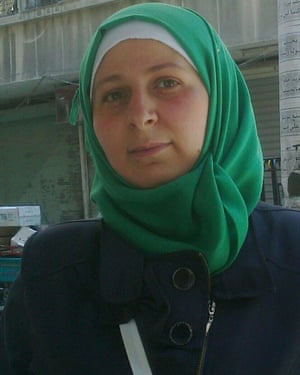
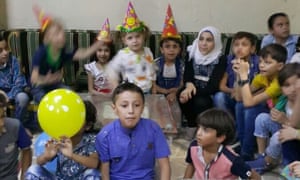
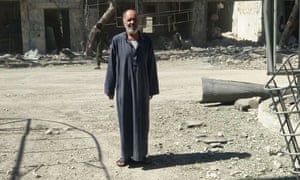
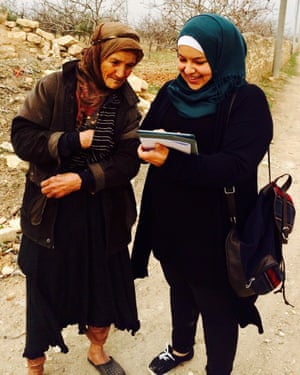
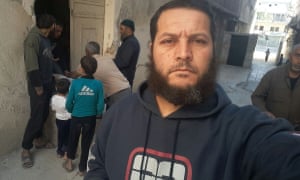
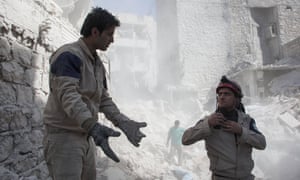
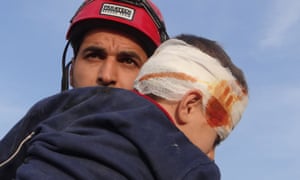
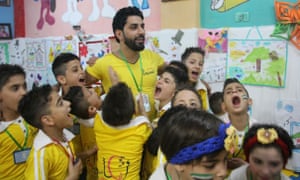
No comments:
Post a Comment